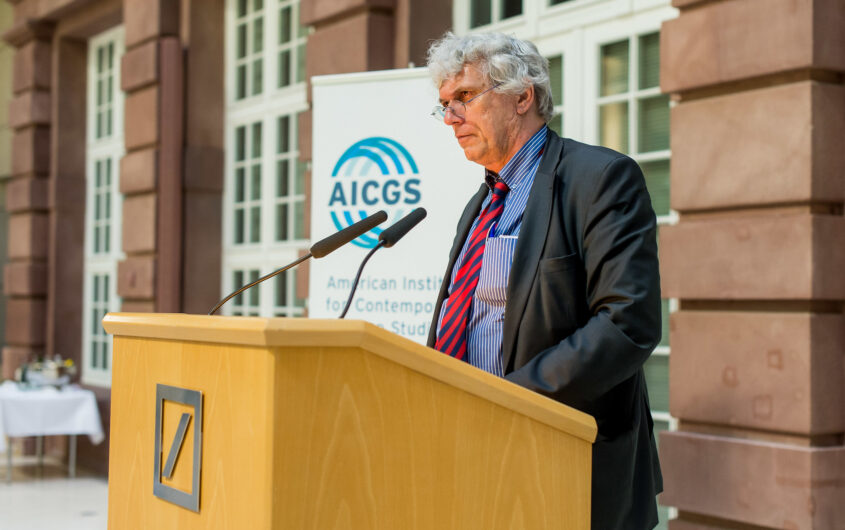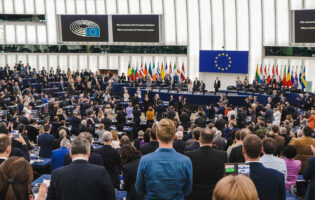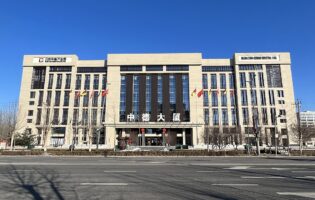
Paul Welfens at AGI in 2013
Russia’s Invasion of Ukraine. Economic Challenges, Embargo Issues and a New Global Economic Order

Andreas Freytag
Friedrich-Schiller-University Jena
Dr. Andreas Freytag is Professor of Economics at the Friedrich-Schiller-University Jena, Honorary Professor at the University of Stellenbosch, and Visiting Professor at the Institute of International Trade, University of Adelaide. He is also Director of G20 Trade and Investment Research Network. He is a DAAD/AGI Research Fellow in October and November 2023.
Dr. Freytag obtained his diploma from the University of Kiel and his doctorate as well as his Habilitation from the University of Cologne. He has published a number of books and articles in first-class peer-reviewed journals on economic policy, international trade policy, development economics, and international policy coordination. He contributes to blogs and for over ten years had a weekly column on wiwo-online, a German magazine.
During his time at the AGI, Andreas Freytag will focus on the substance and path of tightened transatlantic relations against the background of the systemic competition between the West and autocratic states. The latter comprise some emerging economies, including Russia and China. This escalation has geo-political and geo-economic consequences and makes it necessary to strengthen the ties between transatlantic partners as well as to reach out jointly to attract third countries to the Western values.
To maintain Western leadership in standard-setting as well as helping developing countries to enforce universal human rights and environmental standards, there needs to be a coordinated and broad-based strategy to (1) react to Chinese et al. attempts to define and set standards, which become binding for third countries’ companies. Similarly, (2) due diligence legislation may also be more effective if coordinated across the Atlantic. Although not in the center of analysis, another (3) aspect deals with the transatlantic trade relations as such, which are also in need of a revitalization.
This project focuses on the geo-economic aspects of systems competition although it is difficult to disentangle economic and political relations. It analyzes ways to intensify the transatlantic relations with the objective to maintain economic welfare as well as to position the Western partners better to counter autocracies’ attempts to gain influence in the world economy.
Review of Paul J.J. Welfens’ Book
The Russian invasion of Ukraine followed by—at the time of writing this review—21 months of a fierce and, from the Russian side, inhumanly-led war has pulverized a number of certainties in Europe and shaken up perceived equilibria after the end of the Cold War. At the same time, it has brought back Western solidarity, led to an unlikely NATO enlargement, and given the European Union the chance to reform itself and organize another enlargement episode.
The new situation is almost impossible to judge from a disciplinary perspective—it comprises too many issues such as defense policy, security strategies, energy policy, and economic policy as well as European matters and global governance. And of course, it is very early to analyze this situation and derive policy conclusions. Not many academics would take on the task in mid-2022 to give an account of the war’s background, its implication on energy markets and policies in Europe, the consequences for Russia and Ukraine, as well as lessons for a new global economic order.
The late Paul Welfens was not daunted. He dared to write a very comprehensive and well-informed book about these topics that stem from the failed invasion. The risk he took—most likely realizing how short a time he had left—pays off for the reader. Not only does he discuss exactly these themes in four distinct and highly readable parts, but he also offers an analytical toolkit in twenty annexes, which show that he first followed the academic and political discussion about the war and its consequences from day one carefully and second had enormous knowledge about Eastern Europe in general and Russia in particular. As a byproduct, the book offers a rich wealth of data expressed in dozens of tables and figures.
There is a third feature that makes this book extremely valuable. Paul Welfens did not get trapped by his deep understanding and appreciation of Russia to become a Putin-apologist. Quite the opposite, very clearly, he shows that there were many signs that Putin and the Russian nomenclature almost from the start of his presidency has moved into a very confrontational position, in particular threatening former Soviet Republics. On several pages, he shows these signs and asks the well-taken question of why Western intelligence agencies and think tanks did not notice the full negative potential of this confrontational spirit.
To summarize the content of this book of more than 400 pages is a challenge, which also has to do with its only weakness. The book is not concisely edited and somewhat eclectic, presumably also because of the hurry with which it was produced. In a very associative manner, Paul Welfens throws in thoughts and comments on different aspects of the topic and sometimes even side issues such as Brexit or Taiwan without much connection to the line of argument, which leads to repetitions and makes reading somewhat burdensome.
The book offers a rare combination of analytical depth and topical width, which is absolutely necessary when approaching the Russian aggression from a political economy perspective.
Apart from that, the structure and logic of the book are striking. Part I gives the readers the context. Welfens offers a very good analytical overview describing the background of the war including a perspective on energy markets and the West’s misunderstandings of Russian politics and policies in Chapter 1, followed by a chapter about the developments after the war started. In Chapter 3, the special relationship between the United Kingdom and Russia is analyzed, before the perspectives of energy markets are analyzed. Here, the economist Paul Welfens was a bit too pessimistic with respect to the capacity of Western companies and politicians to deal with an embargo, which finally was imposed by the Russian side, albeit after the publication of the book. In this chapter, the ongoing academic discussion is neatly summarized and criticized.
In the rather short Part II, Welfens analyzes the effect of energy boycotts. This part is—no wonder—outdated, as the dynamics of war and sanctions after the publication date could not be foreseen by the author. Notwithstanding, it is an interesting read, as he assesses the state of the academic discussion carefully in Chapter 6. Very early after the war, a team of German economists (Bachmann et al. 2022)[1] predicted a rather mild economic consequence of a complete boycott of German gas imports from Russia, which was unduly sharply criticized by the government. Their prediction was not as erroneous as both the government and Welfens argued who—as opposed to Chancellor Scholz—is not polemic but leads a thorough academic discussion. In Chapter 7 he discusses the effects of energy boycotts on different parts of the world.
This perspective is widened in Part III of the book, which is dedicated to “wider economic challenges” after the war. This is the most informative section, as it offers a comprehensive picture. In Chapter 8, the immediate economic effects in the world are discussed; the chapter includes another academic discussion of a paper predicting serious consequences for the Russian economy (Sonnenfeld et al. 2022).[2] This paper does not offer a good prediction of future trends, which Welfens clearly saw only a few weeks after its publication. Chapter 9 discusses the enormous challenge that millions of refugees have and impose on Ukrainian neighbors. In Chapter 10, Welfens carefully assesses the prospects of Ukraine joining the European Union, which he judges critically—again his enormous knowledge about Eastern European countries in transition pays off. Finally, Chapter 12 takes stock of the costs of reconstruction. Although it is too early to judge even today and all the more last summer, the analytics of this chapter convince.
Paul Welfens uses Part IV, called “The Implications for a New Global Order,” to present his vision of the future of global governance. The chapters in this part go a bit beyond the general theme of the book. This is certainly justified when considering that the Russian invasion was planned and realized against the background of a cooling geopolitical climate with the upcoming systemic rivalry of the unequal partners Russia and China on the one hand and the West on the other. Chapter 12 sets the stage, as it offers different scenario perspectives. Chapter 13 offers a comprehensive discussion of the upcoming global order, which will be a challenge for the liberal Western order. In the final Chapter 14, Paul Welfens draws the right conclusion, arguing that the future of the free world is only secured if we stick to the fundaments of the liberal order created after World War II, which does not imply that changes are unnecessary.
This book is not an easy read, which is in part due to the topic itself and in part the author’s responsibility as he touches upon all relevant questions related to the topic. But it offers a rare combination of analytical depth and topical width, which is absolutely necessary when approaching the Russian aggression from a political economy perspective. Therefore, the book will serve readers as a sort of encyclopedia in years to come, when they want to recapitulate the events in Europe beginning in February 2022. It is truly sad that the readers cannot address their questions and discuss the book with Paul Welfens anymore; he would have loved to engage with us in fruitful and serious conversations. So we are at least left with the great legacy of an original thinker and thorough scientist.
Prof. Dr. Paul J.J. Welfens was a Geoeconomics Non-Resident Senior Fellow at AGI. He was Jean Monnet Professor for European Economic Integration, chair for Macroeconomics, president of the European Institute for International Economic Relations (EIIW) at the University of Wuppertal; Alfred Grosser Professorship 2007/08, Sciences Po, Paris; and Research Fellow, IZA, Bonn. Prof. Dr. Welfens was a McCloy Fellow at AGI from 1989-1990 and remained a frequent contributor to the Institute. He passed away on November 11, 2022.
[1] Bachmann, R. et al, “What if? The Economic Effects for Germany of a Stop of Energy Imports from Russia,” ifo Institute (Munich, 2022). https://www.cesifo.org/en/publications/2022/working-paper/what-if-economic-effects-germany-stop-energy-imports-russia
[2] Sonnenfeld, J. et al, “Business Retreats and Sanctions Are Crippling the Russian Economy” (July 19, 2022). https://papers.ssrn.com/sol3/papers.cfm?abstract_id=4167193.









